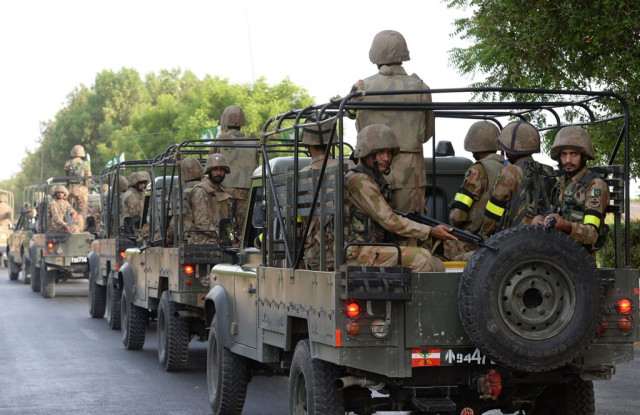Pakistan, Afghanistan optimistic over bilateral security arrangement
Islamabad eagerly seeking Kabul’s cooperation to prevent local terrorists from fleeing.

President Karzai’s top security adviser Rangin Dadfar Spanta’s visit to Islamabad on Thursday to talk to senior defence, foreign and intelligence officials of Pakistan was seen as an important step at a time when the latter is eager to seek Kabul’s cooperation to make the ongoing military operation in North Waziristan successful.
The day-long trip of Spanta, an influential figure in Karzai’s team, played down the hype created by Afghan media over escalating tension along the border, as both countries anxiously need each other’s cooperation at this sensitive juncture. Islamabad has genuine concerns over the sanctuaries of the Pakistani Taliban who routinely launch attacks on border posts.
Afghanistan also insists that Afghan Taliban leaders and members of the Haqqani network use Pakistani soil to plan cross-border attacks. Karzai, on a number of occasions, has publicly stated that the reclusive Taliban leader Mullah Omar lives in Pakistan; a claim that has always been denied by Islamabad.
Islamabad has long-standing concerns about the regrouping of the Pakistani Taliban leaders in the border regions, and it does not want more militants joining them as a result of the North Waziristan operation. It is now a test for the Afghan government and security forces to respond to Pakistan’s call for boosting security along the common border.
Pakistani security officials believe the entry of Taliban militants fleeing from North Waziristan into Afghanistan could emerge as a serious future challenge for their country if Kabul does not stop them.
A Pakistani Taliban leader in a recent interview had stated that the military operation would compel them to cross the border into Afghanistan and that could be more problematic for Pakistani forces.
“We would be more dangerous for Pakistan if we are pushed towards the Afghan side of the border,” the TTP leader had warned when the group sensed a military offensive was on the cards.
As the two neighbours have now agreed for bilateral security cooperation, it has raised hopes that the working group can yield results since there is no other option left for the two countries.
“Pakistan now faces similar threats as Afghanistan did and both could deal with these challenges through cooperation,” Khpalwak Sapi, a senior journalist working for the leading private channel Shamshad TV, told The Express Tribune from Kabul via phone.
“We have seen the politics of blame games, deception, cheating and tactics over the past 30 years. It is now time to put an end to this practice,” Sapi added.
Former Pakistani ambassador Ayaz Wazir is also confident about the outcome of growing Pak-Afghan interaction. However, he said only practical steps can achieve the required results. “It is a good agreement to establish a joint working group on security, provided it is supported with similar intentions.”
He said similar statements have been made by leaders of the two countries before, but were not followed through with practical steps. “This agreement, we hope, will be followed in letter and spirit,” said Wazir, who has also served as Pakistan’s consul general in Afghanistan’s Mazar-e-Sharif.
A welcome step
Afghanistan and the United States have been urging Pakistan for years to opt for a major push in North Waziristan, which they claim the militants use as a launching pad for cross-border attacks on foreign and Afghan forces.
During his visit to Pakistan in May this year, US Deputy Secretary of State William J Burns left a clear message for the Pakistani leadership to “sustain pressure on militant groups, deny them a safe-haven, and prevent cross-border attacks.”
During that time, Pakistani fighter jets had started ‘targeted airstrikes’ in North Waziristan as the peace dialogue process faced a deadlock.
Afghanistan had welcomed these targeted airstrikes and its senior defence officials had hoped the offensive would improve the fragile security situation on both sides of the border.
As Pakistani forces have now launched the long-awaited major offensive against local and foreign armed groups in North Waziristan, the country’s leadership is anxious to seek cooperation from Afghanistan to make the operation successful.
“We are conducting an operation to eliminate terrorism and it is in Afghanistan’s own interest to cooperate with Pakistan. Our expectation is that Afghanistan would [cooperate],” Pakistan Foreign Ministry Spokesperson Tasnim Aslam remarked.
Published in The Express Tribune, June 28th, 2014.



















COMMENTS
Comments are moderated and generally will be posted if they are on-topic and not abusive.
For more information, please see our Comments FAQ